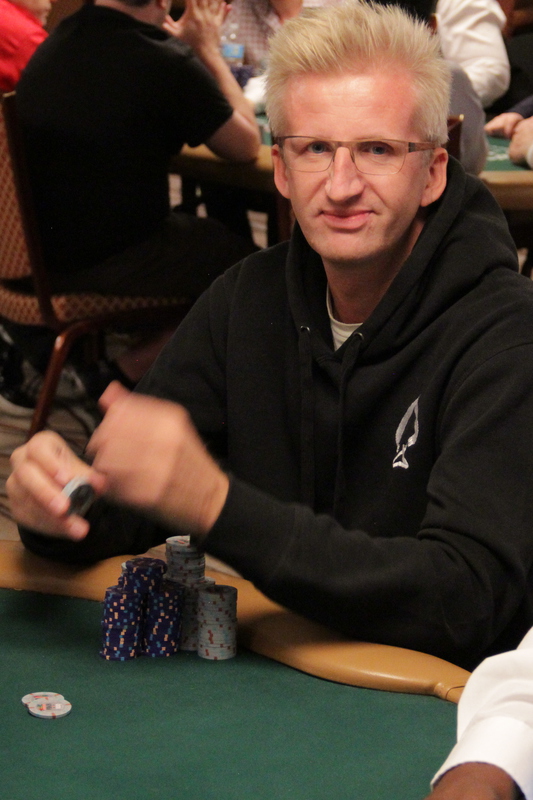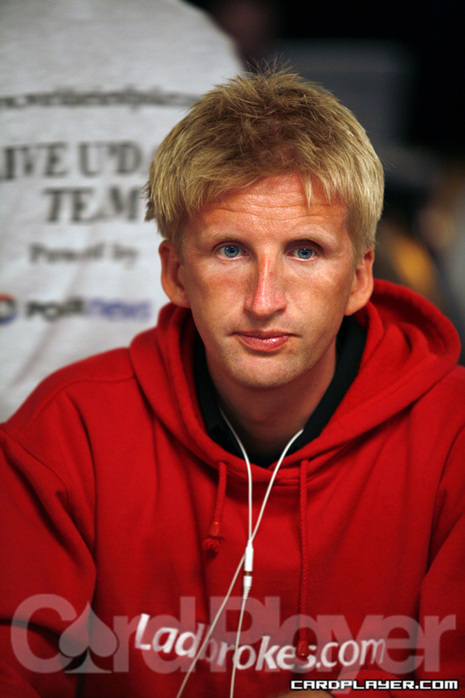






Poker Player PROfile: Andreas HøivoldNorway’s Andreas Høivold Talks Living in Las Vegas and “Crazy Scandinavian” Stereotypes |
|
|
One of the highest earning live tournaments players to come out of Norway, Andreas Høivold has been living and playing poker professionally in Las Vegas since 2009. The Scandinavian pro initially came to Nevada to appear on season 6 of the show High Stakes Poker, but chose not to use his ticket home when he married a poker dealer. Although the marriage is now over, Høivold chose to stay in Las Vegas for the time being and continues to play cash games and tournaments.
Høivold picked up his first major tournament cash back in 2005, earning $1,673 for a ninth-place finish in the Amsterdam Master Classics of Poker. Not long after that score Høivold broke out on the live tournament poker scene when he finished third in the Poker Millions V in 2006 for $250,000 and then won the 2007 European Poker Tour Dortmund for a massive score of $880,572.
Diana Cox: What led you to move out here, versus staying in Norway?
Andreas Høivold: It started with me coming to play High Stakes Poker, and I ended up meeting a girl here and did the most stupid thing I’ve ever done, I got married and everything. I’m not married anymore, and it cost me a ton of money, but I’m done with that. I’m still living here. I don’t know for how long.
DC: It’s been about five years now. Outside of tournament poker, what cash games are you typically playing in?
AH: It depends. I play anything from $1-$2 to $50-$100, when I play high-stakes poker. It totally depends on what I feel like playing and what games are going, and if I’m playing with someone else, if I’m drinking or not.
DC: If you’re going from playing low, to then switching back to playing high-stakes, do you need to adjust your game dramatically?

DC: Do you have plans to try and master the mixed games?
AH: I play a bit of the cheaper tournaments because you get a lot of volume in. The problem is that you can’t play online anymore. I used to play on PokerStars a lot, and I can’t do that anymore. So that’s one of the reasons why I will probably move out of here again. Because when I came here, it was illegal to play live poker in Norway but it was okay to play online. When I came here, you could play both, and now I can’t play online here. And it’s getting closer to legalization in Norway for live poker.
DC: So when you started playing initially, it was online?
AH: Yes, but I also played [live] with friends even though it was illegal. It’s no big secret, it’s not like I’m afraid the police will come catch me for anything. We even had policemen playing in those games. Until a few years ago, everyone considered [those games] just friendly and people having fun, and then, something happened, and they started arresting people that played tournaments. Especially if it was like, someone arranging it and someone taking the rake. For me, I just love the game. We played really small limits, and I started playing a little bit online, learning the game.
DC: Did people play different in Europe versus the U.S.? Were there things you had to adjust to?
AH: Online, it’s pretty much a mix of everyone, so no matter where you’re playing, it’s a little bit different for what times you’re playing, if it’s daytime or nighttime in different parts of the world. In live games, it’s different, both in tournaments and cash games. In general, I feel that Europeans are more crazy. They are more aggressive in general. Especially from up in the north, like Norway, Sweden, and especially Finland, people think that we are crazy, but we’re crazy with a purpose. It’s not like we are only splashing money without having a reason for doing it. But aggression is profitable in poker in general. Some of us get too aggressive sometimes, but we of course have to adjust. I’ve had problems adjusting here. I have better results in Europe, for sure. Probably people here think I’m as crazy as I am, so they don’t believe me at all. Sometimes, they’re giving away money to me, or chips, because they think that I’m bluffing all the time. And I’m not bluffing all the time, especially playing Americans. I’m definitely not bluffing all the time.
DC: So does that reputation of being the crazy European work to your advantage at times?
AH: Yes.
DC: Can you talk about the times when it doesn’t work to your advantage.
AH: The problem is, when I play tournaments, you have long periods of time when you don’t get any cards. If you play a cash game, you can add more money, or you can more or less sit out for a long time in a cash game. If you don’t get any cards in a cash game and you play at a difficult table, you can play one hand or two hands an hour, you lose a little chips, but you don’t lose a lot. But in tournaments, you can’t sit out for a long time, because the blinds are going up, and the antes, and so on. In tournaments, you have to do something when you don’t get cards. When I play in Europe, and I don’t do anything for 20 hands, they see that, and think, ‘Okay, he’s not playing as crazy as we thought he would be.’ And then when I do something, they believe me. But here, it’s like I can sit two hours without playing a hand, and if I play a hand, they automatically think I’m bluffing. So, it can be difficult sometimes in tournaments. For some reason, people love to catch me in a bluff. So, they will call me more than they call other people, and sometimes that’s really good. I have people calling me down pretty much whenever I have a super good hand, and it happens so often.
 DC: When a player calls you down and you have it, does that anger them at all? Do they get mad when it turns out you weren’t bluffing?
DC: When a player calls you down and you have it, does that anger them at all? Do they get mad when it turns out you weren’t bluffing?
AH: Not mad, exactly. Most of the time, it makes them disappointed in themselves. Some people try to bluff me in really bad spots. When I call them, they can’t understand how I can call them with whatever I’m calling them with. They’re not telling a story that connects at all. And then I will end up calling them with ace-high or whatever it is.
DC: You said that people from Scandinavia tend to have this reputation of being kind of crazy at the table. Why do you think that is?
AH: Maybe we are kind of like Vikings from the old times (laughs). We have done crazy things a lot. If some people start doing it, then other people see that it works, then it’s like, ‘Okay, he’s doing it, it works, he’s winning money and playing crazy. I want to play crazy, too.’ Today, so many people, even Americans play pretty crazy. The aggression today compared to what it was 10 years ago is insane. Today, playing really good, tight, aggressive poker can very often, especially in tournaments, be the best. In cash games don’t play too passively, then you can pretty much make money playing both tight and aggressively.
DC: You said you might end up going back to Europe. If you did, would it solely be for the purpose of playing online, or do you find the live tournament and cash games there are better as well?
AH: It’s a mix of many things, not only poker. I’m starting a website that will be illegal here because it will have online poker on it. Also, my family is from Norway, and I miss them a lot. It’s at least 20 hours to get back and forth there, and I don’t like spending a lot of hours in a plane. I also have trouble adjusting to the time difference. I like Europe a lot. I miss my family and I miss a lot of my friends. It’s also a thing with poker, I have better results there. For a long time, the reason was that I wanted to be the first to win two EPTs, but that accomplishment is already taken.
DC: Is poker something you plan to do for the foreseeable future?
AH: Yeah, at least for like, 30 or 40 more years.
